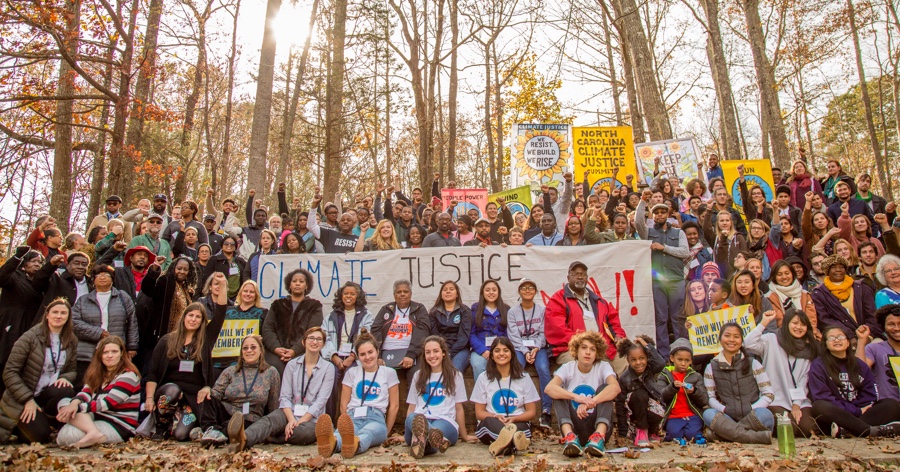Planes, Trains and Automobiles: Transportation and Climate Change
Jessie Fischer
|August 1, 2012

“Sorry, guys!”
That’s not usually the way I greet my parents when I haven’t seen them in over a month, but it was the first thing out of my mouth when I arrived in St. Louis last week after a longer than normal journey on Amtrak’s Missouri River Runner route, which travels the 283 miles across the state from Kansas City to St. Louis.
Generally, I love the train. Compared to traveling by car, it offers better scenery (yes, even in Missouri!) and is more economical (about half the cost of me driving to St. Louis and back), environmentally friendly (yay for public transportation!), conducive to productivity (I can get work done on board rather than having to focus on the road), and usually relatively fast. In fact, my trip from downtown KC to the Kirkwood station in St. Louis usually only takes about 5 hours. But on this particular evening it took six. Therefore, although my train left on time, my parents, who had graciously agreed to pick me up from the station, had been waiting for me for over an hour, and we were all tired and annoyed… not exactly the way I had planned my visit starting out.
So why the delay? Well truth be told, I wasn’t quite sure at first. In fact, for the majority of the ride I wasn’t even aware that I would be getting in so late. I mean, it’s not like we broke down or anything. Sure, at one point I did briefly suspect that we were going a bit slower than usual, but I didn’t think much of it until the conductor announced the upcoming Hermann stop only minutes before I was planning on arriving in St. Louis. (For those of you not from Missouri, Hermann is a good 75 miles from Kirkwood). I knew something was wrong.
Just then the conductor walked by. “Excuse me,” I said, “but why are we so late?”
“Well,” he started, “you know how roads can buckle when it’s too hot?” he asked me.
What do I look like, an engineer? I thought. But I wanted to be polite. “Uhh… sure,” I responded.
“Well the same thing can happen to train tracks. So whenever it’s above 100 degrees outside, our speed is restricted and we’re not allowed to go above 50mph,” he explained.
It was 104 degrees in Kansas City that day, 13 degrees above the historical average. And the heat had lasted well into the evening.
“How fast do you usually go?” I asked, instantly curious.
“Usually about 75mph,” he answered.
“Wow.”
No wonder we were running late!
According to Amtrak, the River Runner is on time more than 90 percent of the time. However, considering that Missouri had at least thirteen days with temperatures over 100 degrees in July alone, I’m guessing that they’re not quite living up to that figure this summer.
And thanks to climate change, summers like this one are likely to become the rule, not the exception. In fact, scientists predict that before the end of the century, if current pollution trends continue, Missouri will see far more scorching summers, with almost a month and a half of days over 100°F per summer! Not a very bright future for Amtrak and its passengers.
And trains aren’t the only things suffering under the extreme heat! Infrastructure across the country, on which we rely on a daily basis, is struggling due to the intense heat, drought, and storms, all disasters made worse by climate change. Jets are getting stuck in excessively hot asphalt, highways are cracking and warping, subways are experiencing similar problems to railways, and even power plants and water treatment facilities aren’t able to do their job.
And the U.S. isn’t alone. For example, half way around the world, in India, almost 10% of humanity (yeah, you read that right) was without power on Tuesday due to failing, overloaded infrastructure that was trying to supply enough electricity to help people deal with the high temperatures.
According to a recent statement made by ExxonMobil’s CEO however, all of this is no reason to worry. Climate change is just “an engineering problem and there will be an engineering solution.” Yet even if that were true (which it’s not!), it’s still a pretty large problem with some pretty expensive solutions- many to the tune of billions of dollars, and most of which will be paid for by taxpayers (i.e. you!).
When we talk about the consequences of climate change, we tend to hear about these huge, overwhelming threats — polar bears going extinct, sea levels rising, oceans acidifying, etc. And while all of these things are extremely unnerving and heartbreaking, it’s easy for them to seem distant to a girl living in the middle of the U.S, hundreds of miles from any ocean and even further from the nearest wild polar bear.
But sometimes something as small as a delayed train ride on a random Tuesday evening can bring it all home. It can make you realize how climate change is a real threat, not just to far away people and animals, but also to me and my daily life. And although it starts as a relatively small annoyance – a late train or maybe even a massive blackout — it reminds me that the longer we wait to act on climate change, the worse the inconveniences and crises will become.
I’m doing what I can to slow climate change. I carry a reusable water bottle, I take public transportation and, of course, as an ACE Educator, I spread the word about the science, the solutions and actions high school students can take.
Whether you’re worried about polar bears, food prices or train routes, our climate needs you too. Together, we can make a huge difference — even if we get there a little later than we’d like.
Join our Youth Action Network
More Blog Posts

Unnatural, Not Unprecedented
For two weeks, residents of Southern California endured a waking nightmare. Parents raced against time – hurrying down the driveway …
Read MoreCrafting a Vision for the Future: My Experience at LCOY USA 2024
Dry and sunny Tempe, Arizona where temperatures have been over 100 F for 113 consecutive days, delegates gathered to attend …
Read More
7 Ways to Weatherproof Your Home on the Cheap (+1 Not-So-Cheap)
As colder weather sets in, understanding how to weatherproof your home is key to maintaining warmth and reducing energy costs. …
Read More